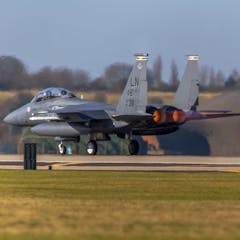
Artículos sobre Nuclear proliferation
Mostrando 1 - 20 de 50 artículos

Iran has reached a stage in its weapons programme where it would be difficult for a single strike to do significant damage.

NATO members, particularly those in eastern Europe, fear a Russian invasion of their territory. By stationing some of its nuclear weapons in the U.K. again, the U.S. could ease those fears.

Russia is walking away from the last remaining treaty designed to limit the proliferation of nuclear weapons.

Small states have limited power to influence global events, but New Zealand can still up its game in an increasingly lawless and dangerous world.

Iran’s pursuit of nuclear weapons centers on producing weapons-grade uranium. Here’s what reports about Iran enriching uranium indicate about its progress toward the bomb.

Russia is raising the stakes with upgraded ballistic missiles and blood-curdling threats from the Kremlin

Diplomacy is needed to head off an arms race between North and South Korea.

North Korea’s test of two new missile systems have stoked fears of a nuclear confrontation in Asia. But the North Korean leader may not be as unstable as he is made out.

The US president is sending a message to Saudi Arabia. But it might also find that negotiations with Tehran are tougher.

Calls to keep talking are getting louder out of fear of escalation and ultimately war – but why are diplomatic relations so difficult for Nato and Russia?

A new nuclear plant called Barakah is nearing completion in the UAE. But it risks further stabilising the volatile Gulf region.

Iran’s leaders are threatening to breach a 2015 agreement that froze their country’s nuclear program. What is uranium enrichment, and what would it mean for Iran’s ability to build nuclear weapons?

Though they were against climate action, the neocons showed that diplomacy can successfully be ignored when facing a huge threat.

North Korea is a major military threat to the US and its Asian allies, but exactly how powerful are its nuclear weapons? An earth scientist explains why it’s hard to answer this question.

Bruce Willis saved the Earth with a nuclear weapon in the 1998 film Armageddon, but the law would need to change for him to do it now.

Exporting nuclear technology is lucrative, but without strict safeguards, buyers could divert it into bomb programs. Why is Saudi Arabia shopping for nuclear power, and should the US provide it?

Israel’s prime minister failed to undermine the validity of Iran’s nuclear deal, and instead ended up demonstrating just how important it is.

An insight into Iranian media and public opinion in the aftermath of Donald Trump’s speech decertifying the 2015 Iran Nuclear deal.

Kim Jong Un’s regime has already earned millions from the export of arms, missiles, drugs and endangered wildlife products.

The international community has been trying to stop North Korea from developing long-range missiles for decades. So what went wrong?
